The crumbling, pothole-filled highways and roads across Guatemala have been shut down, blocked, and barricaded by protesters for more than a week . These protests in defense of democracy and against the country’s embattled Attorney General María Consuelo Porras, and her anti-impunity prosecutor Rafael Curruchiche, show no sign of slowing down, despite the threats of the deployment of riot police and the violence from groups that have infiltrated the protests.
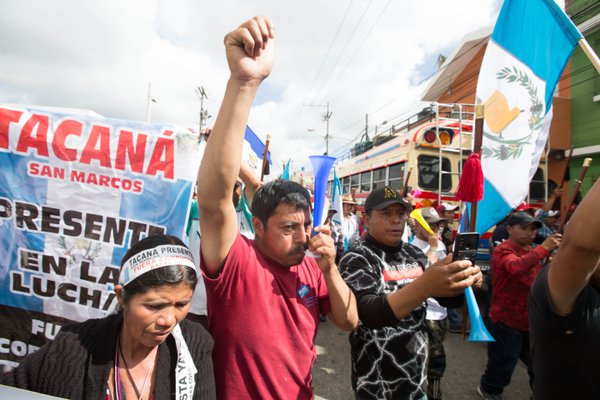
Communities join the protests offices of the Attorney General on October 11 (Jeff Abbott).
.
Since October 2, roadblocks have exploded, growing from twelve to as many as 140 across the country after Porras and Curruchiche oversaw an intervention into the country’s democratic process, seeking to cast doubt on the historic victory of the progressive anti-corruption candidate Bernardo Arévalo in the August 20 presidential run-off election.
Unlike the January 6 riots in the United States and the January 8 riots two years later in Brazil, (which sought to undermine the democratic order) Guatemala’s massive protests have spread in defense of democracy. Protests have remained peaceful and joyous amidst moments of tension.
The leaders of the wave of protests have been the country’s Indigenous communities. The community leaders of the autonomous Indigenous government 48 Cantones of Totonicapán, which represents the 48 communities in the municipality of Totonicpán, called for protests following the fifth raid of the country’s Supreme Electoral Tribunal. The raid, which was issued by Judge Fredy Orellana and led by Curruchiche, resulted in the office of Public Prosecutor seizing the official tallies of the first and second rounds of the elections.
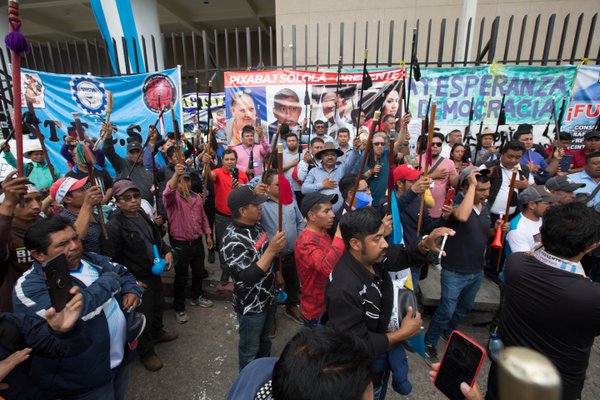
Indigenous Ancestral Authorities raise their varas, a staff that symbolizes their authority, during protests outside the main offices of Guatemala's Public Prosecutor's office on October 11 (Jeff Abbott).
Indigenous communities across the country quickly joined the protests, launching the first roadblocks and an encampment at the main offices of the Public Prosecutor’s office in Guatemala City. Among those who joined to represent the voices of Indigenous communities was Miguel Ángel Manuel Alvarado, a member of the Mayan Achí Indigenous Ancestral Authorities of Rabinal, Baja Verapaz.
“We came to support our brothers and sisters from the 48 Cantones of Totonicapán,” Manuel Alvarado told The Progressive. “Our delegation came here to demand the resignation of the Attorney General María Consuelo Porras and of Rafael Curruchiche and Judge Fredy Orellana.”
Attorney General Porras has called the protests “illegal” and called for the police to clear the roads.
Guatemalan President Alejandro Giammattei has refused to acknowledge the demands of the tens of thousands of protesters across the country, suggesting that “foreigners” are responsible for the protests. He also claimed President-elect Arévalo is responsible for the unrest, calling for him to de-escalate the situation.
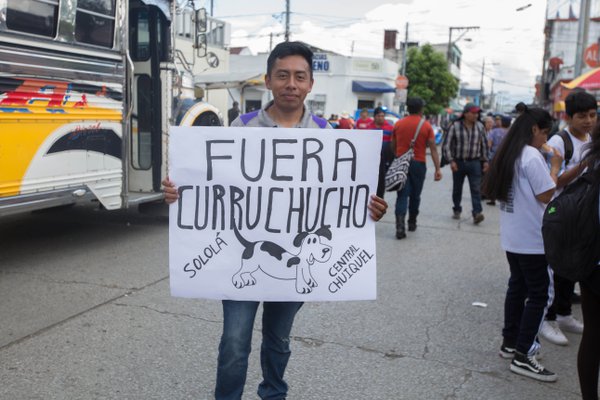
A man holds up a sign denouncing anti-impunity prosecutor Rafael Curuchiche during protests outside the main offices of Guatemala's Public Prosecutor's office on October 6 (Jeff Abbott).
President Giammattei has a history of lying and misinforming the population. Arévalo has pointed this out in recent interviews.
“President Giammattei is misinformed or misrepresents the information,” Arévalo said in an interview with the Guatemalan media ConCritaria. “The coups d'état of the twenty-first century are no longer carried out with bayonets but with magistrates and deputies.”
Describing the attacks against the Democratic ordre, he added, “This is a blow against the electoral system and the result at the polls.”
Guatemala’s political crisis exploded after the results of the June 25 election were made public.
Within weeks of the results, which would lead to a second round of voting on August 20, the country’s Public Prosecutor’s office announced the suspension of Arévalo’s Movimiento Semilla Party due to alleged irregularities in the formation of the party. The spurious order came from a lower court judge, who under Guatemalan law has no jurisdiction over electoral issues, however on October 5 the country’s constitutional court superseded that law.
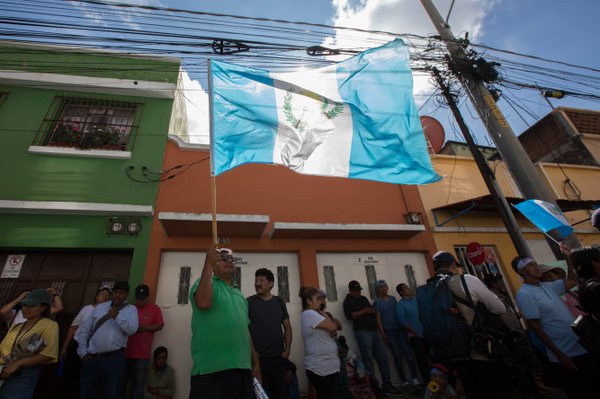
A man flies Guatemala's flag during protests outside the main offices of Guatemala's Public Prosecutor's office on October 9 (Jeff Abbott).
Since the first round of voting, investigators have raided the offices of the country’s Supreme Electoral Tribunal, illegally opening boxes containing the ballots from both rounds of elections and in another raid, confiscating official vote tallies in crates labeled as “evidence.” The actions of the Public Prosecutor’s office are meant to stoke accusations of fraud in the elections.
The international community has continued to denounce the interventions of the Public Prosecutors office. On October 10, the President of the Organization of American States Luis Almagro called for an end of the political persecution in Guatemala, demanding that the actors seeking to undermine the elections respect the results and that they continue the transition of power.
Almagro also criticized Porras for choosing to carry out the political persecution in place of combating organized crime.
“We have seen at this time how they have investigated the [Semilla] party,” Almagro said. “It is incomprehensible because we have not seen the same capacity for action against organized crime, corruption, and drug traffickers.”
Protests have remained peaceful. But the Giammattei Administration has sought to undermine the protests, suggesting without evidence there had been acts of violence and looting. On Monday, as President Giammattei made a nationally televised speech denouncing “foreign interference” and ignoring the demands of protesters, a group of infiltrators sought to provoke violence.
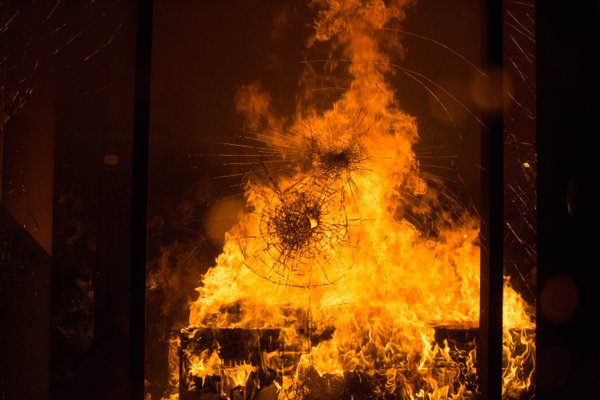
A tourist center in Guatemala City's historic center is set on fire by alleged infiltrators on October 9 (Jeff Abbott).
The group of masked individuals destroyed an altar in the plaza dedicated to forty-one girls who died in a government safe house fire in 2017 before moving on to destroying the Monument to 200 years of independence. Police responded with tear gas, but not before the tourist centers were on fire and nearly every window had been broken.
This is not the only violence that protesters have faced.
Roadblocks outside the private city of Cayala, which sits within the limits of Guatemala City, were met by heavily armed individuals carrying AR-15 rifles. Days earlier, an impatient driver ran over a motorcycle that was blocking the road, before quickly speeding away.
Misinformation has also spread rampantly across social media, seeking to generate fear and a rejection of protests. Government officials and other opponents of Arévalo have sought to spread misinformation on social media.
Images of vacant grocery stores spread across X (formerly Twitter) while the head of the country’s main airport suggested that the airport was going to remain without fuel, before later walking back the statement. But Mexican airline Volaris announced that it will suspend flights to Guatemala. President Giammattei also falsely stated a truck carrying oxygen to a hospital was stolen.
However, organizers say the protests will continue until their demands are met.
“We will continue to join the struggle,” Manuel Alvarado says. “We will continue to make the alliance of Indigenous peoples, since the fight will continue if the [Attorney General Porras] does not resign.”
Jeff Abbott is an independent journalist currently based out of Guatemala. “The Other Americans” is a column created by Abbott for The Progressive on human migration in North and Central America.
A voice for peace, social justice, and the common good! Since 1909, The Progressive magazine has aimed to amplify voices of dissent and voices under-represented in the mainstream, with a goal of championing grassroots progressive politics. You have the power to make a difference at The Progressive by giving us the strength to grow—allowing us to dig deeper, hit harder, and pull back the curtain further to hold accountable those who abuse power! Donate

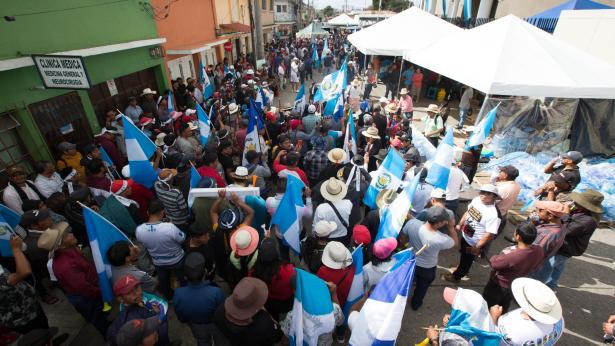
Spread the word